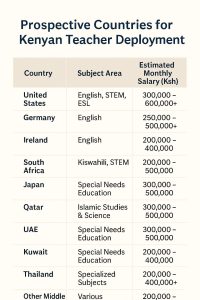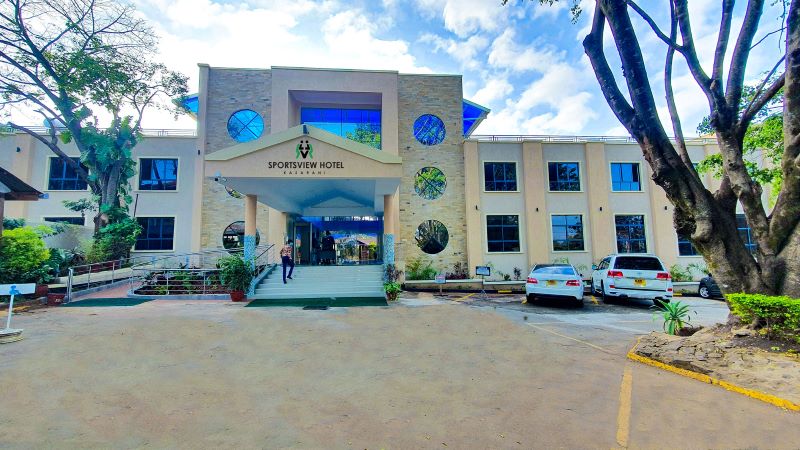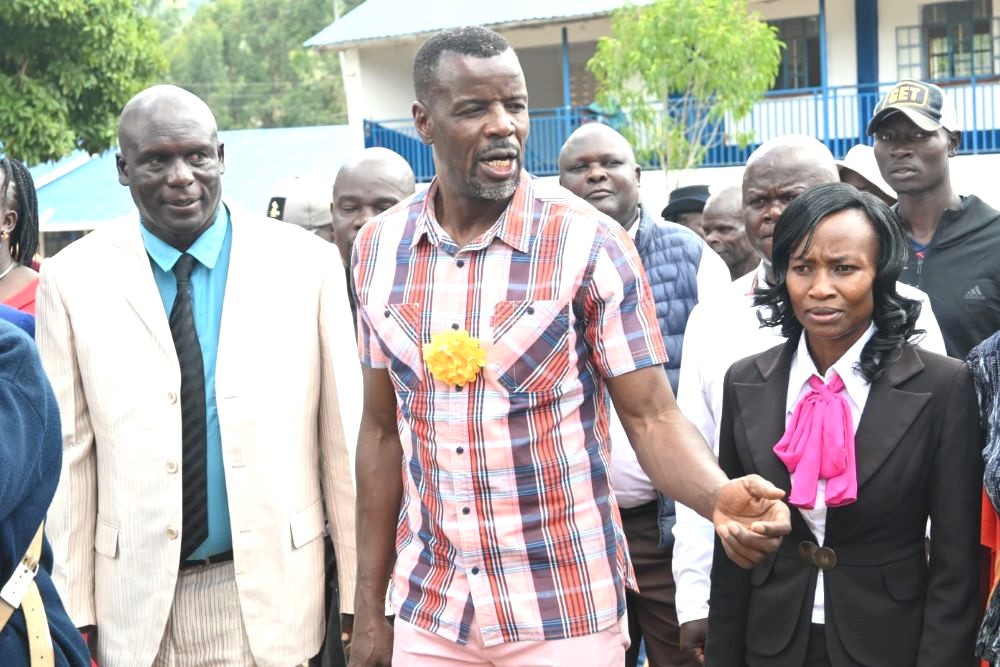The Teachers Service Commission, TSC has established a comprehensive framework for international teachers deployment, ensuring that the process is transparent, efficient, and beneficial to both teachers and the country.
In the framework, the Commission has put in place critical information every teacher should know about the overseas jobs.
Eligibility Criteria
Only teachers meeting minimum professional standards are considered for overseas deployment. This includes:
Relevant teaching qualifications (diploma, bachelor’s degree, or higher), a proven record of effective teaching, Subject specialization in high-demand areas such as mathematics, science, English, Kiswahili, and special needs education, and demonstrated professional conduct and adherence to TSC codes of ethics.
Partnerships with Foreign Institutions
The TSC collaborates with governments and educational institutions abroad to identify staffing needs. Countries like South Sudan, Tanzania, Qatar, UAE, and Kuwait have agreements with Kenya to recruit qualified teachers. These partnerships ensure that teachers are placed in environments where their expertise is most required.
Contracts and Teacher Welfare
A key aspect of the framework is safeguarding teachers’ welfare. Deployment contracts clearly outline terms of service, salaries, benefits, accommodation, health insurance, and repatriation arrangements. This structured approach prevents exploitation and ensures teachers’ overseas experiences are safe and professionally rewarding.
Monitoring and Evaluation
The TSC maintains oversight of teachers abroad, tracking their performance, welfare, and overall impact. Regular reporting from host institutions, feedback from the teachers themselves, and continuous monitoring ensure that overseas deployment aligns with Kenya’s national education objectives.
Prospective Countries and Expected Salaries
Kenya’s overseas deployment initiative targets countries with high demand for qualified teachers. Below is a detailed overview of prospective destinations and expected monthly salaries in Kenyan Shillings (Ksh):
Country Subject Area Estimated Monthly Salary (Ksh)
United States English, STEM, ESL 300,000 – 600,000+
Germany English, STEM 250,000 – 500,000+
Ireland English 250,000 – 500,000+
South Africa Kiswahili, STEM 200,000 – 400,000
Japan Special Needs Education 200,000 – 400,000
Qatar Islamic Studies, Science 300,000 – 500,000
UAE Special Needs Education 300,000 – 500,000
Kuwait Special Needs Education 300,000 – 500,000
Thailand Specialized Subjects 200,000 – 400,000
Other Middle Eastern & European Countries Various Subjects 200,000 – 500,000+

The framework also states that the Salaries vary depending on qualifications, experience, subject area, and employer agreements. Most overseas packages also include housing, health insurance, and travel allowances.
Challenges in Overseas Deployment
While overseas deployment presents numerous benefits, it also poses challenges that must be managed carefully.
Cultural Adaptation
Teachers may face challenges adjusting to new education systems, classroom dynamics, and societal norms. Language barriers and unfamiliar pedagogical practices can affect performance. Pre-departure cultural orientation and language training mitigate these challenges.
Retention and Domestic Shortages
Some teachers may prefer to extend their overseas stay, leading to gaps in local schools. Balancing overseas opportunities with domestic staffing requirements is critical to avoid educational disruptions in Kenya.
Logistical Hurdles
Visa processing, accommodation arrangements, and timely salary disbursement require careful coordination. Clear contractual terms and legal protection ensure smooth deployment.
Equity Concerns
Transparency in teacher selection is essential. The TSC must ensure opportunities are accessible to teachers from all regions, genders, and backgrounds. This prevents favoritism and builds trust in the deployment process.
Case Studies and Regional Comparisons
Tanzania and South Sudan
Kenyan teachers deployed to Tanzania and South Sudan have helped reduce pupil-to-teacher ratios, particularly in STEM subjects. In South Sudan, they contribute to rebuilding educational infrastructure, training local teachers, and improving literacy rates.
Egypt and South Africa
Teachers in Egypt focus on science and technology education, gaining exposure to advanced curricula. In South Africa, Kenyan teachers improve rural education outcomes in mathematics, science, and special needs programs.
Germany and the United States
Deployments to Germany and the U.S. provide exposure to cutting-edge educational technology, inclusive education practices, and curriculum development. Returning teachers bring innovative methods that enhance Kenyan classrooms.
The Future of Kenyan Teacher Deployment
The TSC continues to refine its overseas deployment framework. Future strategies include:
Pre-departure Training: Cultural orientation, language skills, and international pedagogy workshops prepare teachers for success abroad.
Mentorship Programs: Experienced teachers guide new recruits, ensuring smooth integration.
Research and Feedback: Continuous evaluation of teacher experiences abroad informs policy improvements.
The TSC’s overseas teacher deployment policy is a forward-thinking initiative that balances professional growth, economic empowerment, and national interest. Kenyan teachers gain international exposure, higher salaries, and professional development opportunities, while Kenya strengthens its global reputation as a hub for quality education.
Despite challenges like cultural adaptation, retention, and logistical hurdles, the structured framework protects teachers and ensures their success abroad. The experiences gained overseas enrich the domestic education system, foster innovation, and improve learning outcomes for future generations.
Ultimately, the TSC’s overseas deployment initiative is more than a policy—it is a strategic investment in Kenya’s human capital and global educational influence. By nurturing educators and offering international opportunities, Kenya empowers teachers to thrive, enhances professional standards, and contributes meaningfully to global education.
By Hillary Muhalya
You can also follow our social media pages on Twitter: Education News KE and Facebook: Education News Newspaper for timely updates.
>>> Click here to stay up-to-date with trending regional stories
>>> Click here to read more informed opinions on the country’s education landscape






